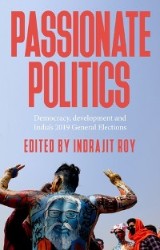Details

Passionate politics
Democracy, development and India's 2019 general election|
149,99 € |
|
| Verlag: | Manchester University Press |
| Format: | EPUB |
| Veröffentl.: | 31.01.2023 |
| ISBN/EAN: | 9781526157737 |
| Sprache: | englisch |
| Anzahl Seiten: | 240 |
DRM-geschütztes eBook, Sie benötigen z.B. Adobe Digital Editions und eine Adobe ID zum Lesen.
Beschreibungen
<p>Passions matter to politics. Yet, much of the work on passions in politics focuses on such spectacular events as social movements, civil wars and revolutionary upheavals, but ignores electoral politics as banal. The contributors to this book trace the importance of passions to electoral politics with a focus on India’s landmark 2019 General Elections which saw the decisive re-election of Narendra Modi as the country’s Prime Minister.<br><br>This book illustrates the economic, social and cultural processes that shaped political passions in India during the summer of 2019. The contributors compel us to take seriously the ‘structures of feeling’ in politics. Such an approach requires interdisciplinarity. Which is why the book brings together a stellar team of economists, political scientists, sociologists, historians and geographers to explain Modi’s resounding win.</p>
In May 2019, India’s Prime Minister Narendra Modi won the world’s largest election. This book brings together a stellar team of economists, political scientists, sociologists, historians and geographers to explain why Indians voted the way they did.
<p>Introduction: Passionate politics in India today – Indrajit Roy<br><br><b>Part I: Fear, love and fake news</b><br>1 Ordinary conspiracy theories and everyday communalism: Hindutva on the Indian cyberspace – Amogh Dhar Sharma<br>2 People-led campaigns in the 2019 general election: A case study of #Academics4NaMo – Swadesh Singh<br><br><b>Part II: The emotive politics of Hindu nationalism</b><br>3 Neoliberalism and cultural majoritarianism in India – Ajay Gudavarthy<br>4 The BJP and the war on history – Shalini Sharma<br>5 The passionate politics of the Savarna poor – Indrajit Roy<br>6 Seeking humanist Hinduism: Education and new Gurukul coaching models of Hindutva<br>– Suryakant Waghmore<br><br><b>Part III: Love, hate and Kashmir</b><br>7 The historical roots of conflict over/in Kashmir – Sarah Ansari<br>8 This side of paradise: The rise, fall and decimation of regional politics in Kashmir – Shaswati Das<br>9 The fear of Indian settler colonialism and the battle for Kashmir’s soul – Ather Zia<br><br><b>Part IV: Women, gender and love</b><br>10 Love taboos: Hindus, Muslims and moral panics – Charu Gupta<br>11 Why is romance political? – Sneha Krishnan <br><br><b>Part V: What young Indians want</b><br>12 In pursuit of Parivartan: Youth agency and the 2019 general election in Sikkim – Mabel Denzin Gergan and Charisma K. Lepcha <br>13 What do young people want from elections? – Sneha Krishnan<br><br><b>Part VI: The economics of India’s passionate politics </b><br>14 Social oppression and exploitation of Adivasis and Dalits in contemporary India – Jens Lerche and<br>Alpa Shah <br>15 Two large shocks and a long-term problem: The economic performance of the Modi government,<br>2009–14 – Kunal Sen <br>16 Agrarian crisis, farmers’ protests and women’s assertion – Nitya Rao <br><br><b>Part VII: India tomorrow</b><br>17 The Modi government’s authoritarian project in India – James Manor <br>18 The 2019 elections and their implications for Muslim politics – Mujibur Rehman <br>19 Cementing emotions: The new reasoning of majoritarian politics – Gurpreet Mahajan <br>Index</p>
Indrajit Roy is a Senior Lecturer in Global Development Politics at the University of York
<p>In May 2019, Narendra Modi won the world’s largest election. Defying expectations, he led his Bharatiya Janata Party to a resounding victory, with the highest vote share for any party in thirty years, and was re-elected as India’s Prime Minister.<br><br>What accounts for the scale of Modi’s win? Why, despite economic hardship and social strife, did Indians vote so overwhelmingly for him and the BJP? This book explains the economic, social and cultural processes that shaped political passions in India during the spring and summer of 2019. It takes an interdisciplinary approach, bringing together a stellar team of economists, political scientists, sociologists, historians and geographers to explain Modi’s win. Together, the contributors compel us to take seriously the ‘structures of feeling’ in politics.<br><br> Love him or hate him, Modi secured for himself a decisive re-election as India’s Prime Minister. <i>Passionate politics </i>is essential reading for anyone who wants to understand how that happened.</p>
Diese Produkte könnten Sie auch interessieren:

Novellierung der Immobilienwertermittlungsverordnung: Die neue Rechtsnorm des Immobilienmarkts in Deutschland

von: Martin Woltemate

24,99 €















